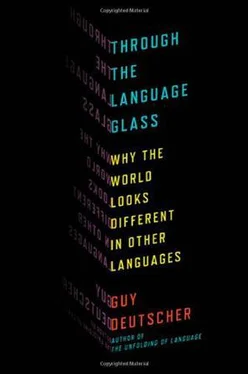If, unlike our shy student, you do press linguists to reveal what their authority for this tenet is, the source that is most likely to be mentioned is a passage from a book called A Course in Modern Linguistics , which was written in 1958 by Charles Hockett, one of the fathers of American structural linguistics. The funny thing is that in this passage Hockett himself went out of his way to explain that the equal complexity was not a finding, merely his impression:
Objective measurement is difficult, but impressionistically it would seem that the total grammatical complexity of any language, counting both morphology [word structure] and syntax [sentence structure], is about the same as that of any other. This is not surprising, since all languages have about equally complex jobs to do, and what is not done morphologically [that is, inside the word] has to be done syntactically [in the sentence]. Fox [an American Indian language of Iowa], with a more complex morphology than English, thus ought to have a somewhat simpler syntax; and this is the case.
Since Hockett takes pains to stress that he is speaking “impressionistically,” it may seem unfair to subject his passage to too much scrutiny. But given its impact on the course of modern linguistics, and given that, in the process of retelling, Hockett’s “impression” somehow metamorphosed into a “central finding” of the discipline, a quick reality check is due nonetheless. Does Hockett’s impression, or for this matter the logic behind it, come up to scratch? Hockett assumes, quite correctly, that all languages need to satisfy a minimum degree of complexity in order to fulfill their complex jobs. From this fact he infers that if one language is less complex than another in one area, it has to compensate by increasing complexity in another area. But a moment’s reflection will reveal that this inference is invalid, because much of language’s complexity is not necessary for effective communication, and so there is no need to compensate for its absence. Anyone who has tried to learn a foreign language knows only too dearly that languages can be full of pointless irregularities that increase complexity considerably without contributing much to the ability to express ideas. English, for instance, would have losed none of its expressive power if some of its verbs leaved their irregular past tense behind and becomed regular. And the same applies, to a much greater degree, to other European languages, which have many more irregularities in their word structures.
In fact, if we replace Fox, Hockett’s American Indian example, with one of the major languages of Europe, say German, it will quickly become apparent how spurious his argument is. German word structure is far more complex than that of English. English nouns, for instance, generally form their plurals simply by adding an s or z sound (books, tables), and there are only a handful of exceptions to this rule. In German, on the other hand, there are at least seven different ways of forming plurals: some nouns, like Auto , add an - s just like in English; others, such as “horse,” add an - e ( Pferd, Pferd e ); nouns like “hero” add an - en ( Held, Held en ); nouns like “egg” add -er ( Ei, Ei er ); nouns like “bird” do not add a suffix at all but rather change a vowel inside the word ( Vogel, V ö gel ); some nouns, like “grass,” change the vowel and add a suffix ( Gras, Gr ä s er ); and finally some nouns, like “window,” don’t change anything at all ( Fenster, Fenster ). One could imagine that German would make up for this enormous complexity in nouns by the exemplary simplicity of its verbs, but in fact German verbs have far more forms than English ones, so the morphology of German is incomparably more complex than that of English. Paraphrasing Hockett, then, we would conclude that “German, with a more complex morphology than English, thus ought to have a somewhat simpler syntax.” But does it? If anything, it’s the other way around: German word-order rules, for instance, are far more complex than those of English.
More generally, the reason why Hockett’s logic fails is that a lot of complexity is merely excess baggage that languages accumulate over the centuries. So when some of it goes missing for whatever reason (more about that later) there is no particular need to compensate by increasing complexity elsewhere in the language. Contrariwise, there is no pressing need to compensate for a rise in complexity in one area by reducing it in another, because the brain of a child learning a language can cope with a mind-boggling amount of linguistic complexity. The fact that millions of children grow up with at least two languages and master each of them perfectly shows that a single language does not even come close to exhausting the linguistic capacity of a child’s brain. So all in all there is no a priori reason why different languages should all mysteriously converge on even roughly the same degree of complexity.

But why, you might well ask, should we waste time on such a priori speculations in the first place? What’s the point of discussing the question of complexity in the abstract, when the obvious way to tell whether all languages are equal is simply to go out to the field with measuring instruments, compare languages’ vital statistics, and determine the exact overall complexity of each one?
There is a joke from the days of plenty in the former Soviet Union about a woman who goes to the butcher’s and asks, “Could you measure me out two hundred grams of salami, please?” “No problem, madam,” replies the butcher. “Just bring me the salami.” In our case, the salami may be there, but the measuring instrument is missing. I would be happy to measure for you the overall complexity of any language, but I have no idea where to find a scale, and neither does anyone else. As it happens, none of the linguists who profess the equal complexity dogma has ever tried to define what the overall complexity of a language might be.
“But wait,” I can hear you thinking. “Even if no one has bothered to define complexity so far, surely it can’t be too difficult to do it ourselves. Couldn’t we decide, for instance, that the complexity of a language is defined as the difficulty it poses for foreign learners?” But which learners exactly? The problem is that the difficulty of learning a foreign language crucially depends on the learner’s mother tongue. Swedish is a snap-if you happen to be Norwegian, and so is Spanish if you are Italian. But neither Swedish nor Spanish is easy if your native language is English. Still, both are incomparably easier for an English speaker than Arabic or Chinese. So does that mean that Chinese and Arabic are objectively more difficult? No, because if your mother tongue is Hebrew, then Arabic isn’t difficult at all, and if your mother tongue is Thai, then Chinese is less challenging than Swedish or Spanish. In short, there is no obvious way to generalize a measure of overall complexity based on the difficulty of learning, because-just like the effort required for traveling somewhere-it all depends on where you are starting from. (A proverbial Englishman learned this the hard way when he got desperately lost in the wilds of Ireland one day. After hours of driving round in circles through deserted country lanes, he finally spotted an elderly man walking by the side of the road, and asked him how to get back to Dublin. “If I were to go to Dublin,” came the reply, “I wouldn’t be starting from here.”)
Читать дальше












